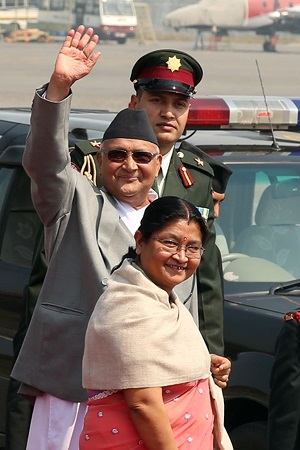Oli and Oil: Fuelling Nepal from India and China (Commentary)
 Manoj Karki / KATHMANDU: After surviving through the border blockade imposed by India that was in fact initially unhappy over the way he was ‘unilaterally’ elected to govern the Nepal state, Prime Minister KP Sharma Oli enjoyed a red carpet welcome in India itself. And he is now in the midst of what many Nepali and Nepal experts believe to be a productive visit of the People’s Republic of China.
Manoj Karki / KATHMANDU: After surviving through the border blockade imposed by India that was in fact initially unhappy over the way he was ‘unilaterally’ elected to govern the Nepal state, Prime Minister KP Sharma Oli enjoyed a red carpet welcome in India itself. And he is now in the midst of what many Nepali and Nepal experts believe to be a productive visit of the People’s Republic of China.
In response to widespread criticism at home for not taking a pro-active role in addressing the grievances of the Madhesh-centric parties to neutralize the impact of a lengthy trade embargo by India, Prime Minister Oli had boasted of making Nepal self-reliant rather than bowing down to the hegemonic interventions by the world’s largest democracy over an emerging democracy that it encircles on all three relatively accessible sides.
Prime Minister Oli went a step further, may be with the intention to catch popular sentiments, in making a tall promise of getting the country rid of power outage within a year. He drew more criticism especially in the mainstream media and social media for promising to install cooking gas pipelines direct to the Nepali kitchens. Only time will tell, how realistic those promises by the Prime Minister were.
But if experts are to be believed the only way Nepal can actually become self-reliant is to decrease the rising dependency upon India. And that is definitely in terms of trade as well as running the state of affairs of the country. And if diversification of trade is a way towards Nepal’s self-dependency, Prime Minister Oli has taken a step forward towards that end. His election to the premiership without ‘involvement, consultation and consent’ of India was already a significant move by the Nepali leaders towards taking charge of the helm of Nepali affairs.
By signing a historic transit and transport treaty as part of the 10-point agreement on Monday, Prime Minister Oli has provided Nepal an option as far as its third country trade is concerned. This will not only reduce Nepal’s reliance on India, but also give landlocked Nepal access to the sea from China. At a press meet held at the Nepali Embassy on Tuesday evening, Prime Minister Oli described the agreement as an ‘unprecedented success’ of his visit. He was however quick to make it clear that the agreement was not targeted against Nepal’s otherwise traditional and only trade partner India.
Though the 10-point agreement did not include a much talked-about fuel trade agreement between Nepal and China, the agreement for China to help fuel exploration in Nepal and to build petroleum infrastructure in the country provides ground for the possibility of such an agreement in the future. With an agreement in principle already signed in the aftermath of the fuel embargo by the only fuel exporter of the country, a commercial fuel trade agreement could be signed without much effort. However, for that to be made a reality, Nepal needs to invest in infrastructure including roads and transit facilities with a high priority. Nepal also needs to push for the realization of the agreement reach to linked Nepal and China through railway connectivity.
However, it is also a fact that China cannot completely replace India as far as Nepal’s trade and transit is concerned. Geographically too, it would require mammoth investments from both sides for Nepal to enjoy trade and transit facilities from China in par with India. Responding to eyebrows raised by the Indian mainstream media over the latest trade and transit agreement that Nepal signed with China, Indian MEA spokesperson Vikas Swaroop said on Tuesday in Delhi that no country could compete with the ‘special relations’ that India has with Nepal. One cannot of course deny that Nepal does enjoy a very special relationship with India. But at what cost, and why did it not matter when Nepal almost faced a humanitarian crisis thanks to the border blockade imposed by its age-old friend and neighbour.
Notwithstanding whether Nepal is going to ultimately materialize a fuel trade agreement with China, the latest China visit by Prime Minister Oli will definitely prove a milestone in the much-needed diversification of trade of the country. As the recent border blockade has proved, Nepal can no longer rely on its traditional trading partner India to help itself move towards the path to economic prosperity. And, Nepal has to enjoy the benefit in real and measureable terms of being locked by the two economic giants of the twenty-first century. RSS
